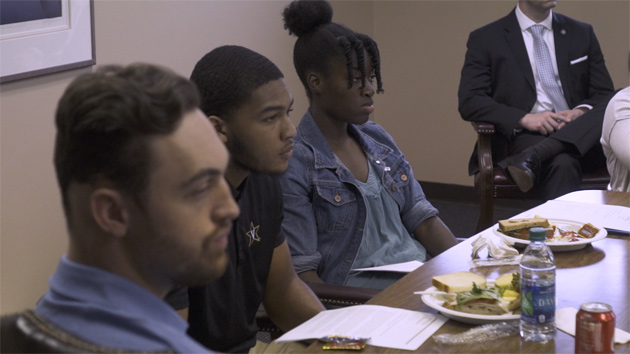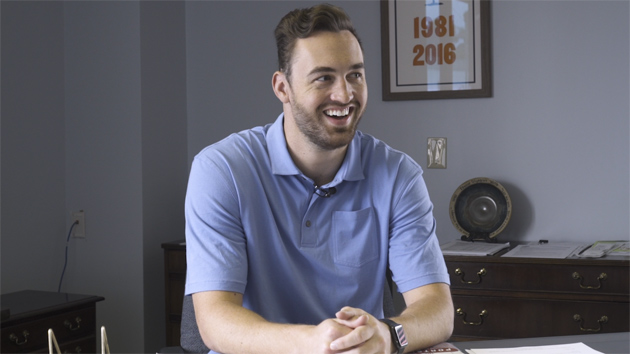
by Shayna Elliot
For many student-athletes, summer means intensive physical training coupled with taking classes to lighten their course load during the playing season. More rare is the opportunity to explore another hallmark of the college experience: a summer internship.
David Williams II, vice chancellor for athletics and university affairs and athletics director, is on a mission to change that. Four years ago, Williams developed an internship program for Vanderbilt student-athletes that spans everything from exploring career paths to helping secure work experiences.
Vanderbilt student-athletes typically begin by attending a career fair, where they are able to talk with potential internship mentors from Nashville-area businesses. In 2015, when Vanderbilt launched the initiative, 36 Vanderbilt student-athletes participated in the internship program. This year, that number grew to 85 interns.
“The student-athletes’ day-to-day tasks vary depending on their internship site,” said Alison Wenzel, assistant athletic director for student-athlete development. “They could be attending a board meeting, completing a scientific analysis of DNA samples, or filming bands at CMA Fest.”
Student-athletes typically work 20 hours per week unpaid, and Vanderbilt provides them with room and board and a meal plan—accommodations that required special approval from the NCAA. Williams also noted that for many student-athletes, “this is the first job they’ve ever had,” adding that the department offers resources to help ease that transition.
While the student-athletes work Monday through Thursday, Fridays are reserved for professional development workshops run by the Vanderbilt Career Center. They cover topics such as professional behavior, etiquette and leadership. Interns also write weekly reflections to better understand their progress and challenges. They also can join a monthlong program called Pre-Flight, targeted to rising sophomore student-athletes, to assist with résumé-building, financial management and interviewing skills. The internships conclude with a short capstone project that participants present to their fellow student-athlete interns.
Wenzel said she hopes the program helps student-athletes refine their skills and career interests to help ensure their success in their first jobs after Vanderbilt. Williams agrees, citing the story of a student-athlete who was struggling to decide on a career path. The student mentioned an interest in law enforcement and was placed with the Nashville Police Department. Her internship confirmed her passion for the field and ultimately led to a job as a police officer.
“We are able to break down stereotypes about student-athletes and help them find a passion,” Wenzel said. “That’s useful in recruiting, because Vanderbilt allows them to have opportunities that other schools might exclude them from.” She added that other universities have reached out to Vanderbilt to ask about setting up similar programs on their campuses.
“I don’t know of any other schools that have instituted as comprehensive of a program as we have at Vanderbilt,” Wenzel said.
For their part, Vanderbilt’s student-athletes learn lessons in their internships that go beyond the classroom—and the playing field.

“This internship showed me how to be efficient day to day and what a day job is really like. It’s opening doors beyond my own access,” said Vanderbilt tight end Turner Cockrell.
Football teammate Frank Coppet, a defensive back, agreed. “I learned about multitasking, how to be on time, and how to collaborate,” he said.
Olivia Simmons, a defender on the women’s soccer team, said this summer’s internship has helped her stay open-minded about career possibilities. “This program can help build direction if you’re unsure of what direction you want to go,” she said.
Cockrell, Coppet and Simmons all intern at Special Olympics Tennessee, where Beth Teegarden, their supervisor, says they work on anything from data entry to event planning. “Their major strength is that they jump in and will learn anything,” Teegarden said. “They bring energy as students to our small staff.”
Evan Suzman, a cross country runner, said based on conversations with fellow runners at other schools, Vanderbilt does a lot more to support student-athletes. “I love Vandy athletics,” he said.
Suzman is working in an autism research lab this summer at Vanderbilt University Medical Center, a position he held during the school year. Although he started out doing data processing in the lab, he is now running his own tests on how hearing and speech can be used to detect autism by tracking sensory differences in infancy.
For Williams, college is all about helping students grow on many different fronts.
“Student-athletes are here to get a college education,” he said. “In our society, that means bettering yourself, and we need to give them these same opportunities to do that. The athletic piece is just the icing on the cake.”